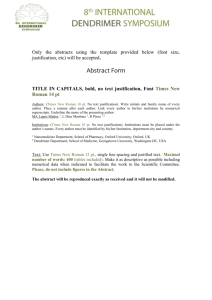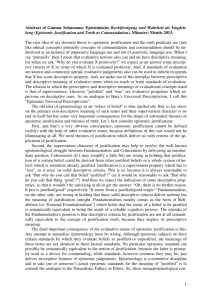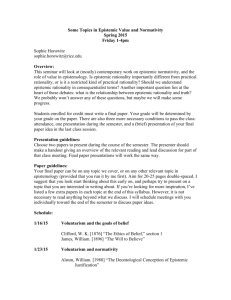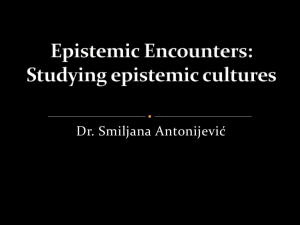Vocabulary - Big Fat Genius dot com
advertisement
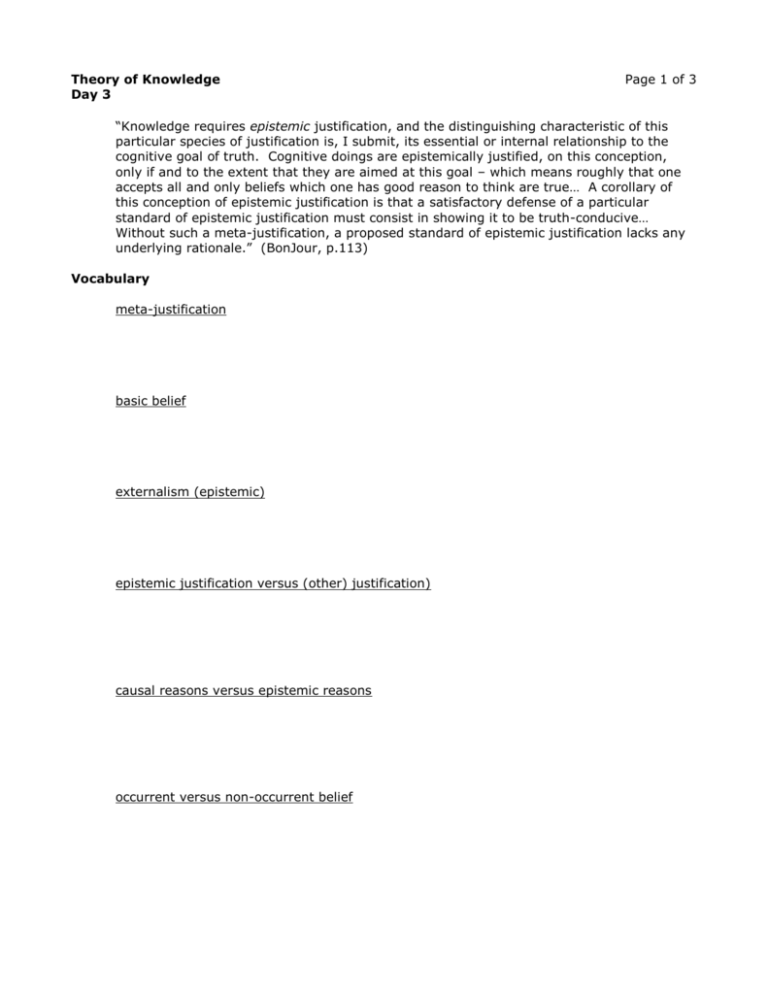
Theory of Knowledge Day 3 Page 1 of 3 “Knowledge requires epistemic justification, and the distinguishing characteristic of this particular species of justification is, I submit, its essential or internal relationship to the cognitive goal of truth. Cognitive doings are epistemically justified, on this conception, only if and to the extent that they are aimed at this goal – which means roughly that one accepts all and only beliefs which one has good reason to think are true… A corollary of this conception of epistemic justification is that a satisfactory defense of a particular standard of epistemic justification must consist in showing it to be truth-conducive… Without such a meta-justification, a proposed standard of epistemic justification lacks any underlying rationale.” (BonJour, p.113) Vocabulary meta-justification basic belief externalism (epistemic) epistemic justification versus (other) justification) causal reasons versus epistemic reasons occurrent versus non-occurrent belief Theory of Knowledge Day 3 Page 2 of 3 BonJour’s argument against foundationalism For some (allegedly) basic empirical belief B Either the justification of B requires meta-justification or it does not This meta-justification is either empirical, a priori, or something else Thus, one of the following is the case: i. B requires empirical meta-justification ii. B requires a priori meta-justification iii. B requires some other sort of meta-justification iv. B requires no meta-justification What is wrong with option (iii)? Any meta-justification either involves a mental state with content or it does not If a mental state has content, then it requires justification If meta-justification does not involve a mental state with content, then (iii) is really (iv) Against Externalism “Whatever plausibility attaches to externalism seems to derive from the fact that if the external relation in question genuinely obtains, then P will not go wrong in accepting the belief, and it is, in a sense, not an accident that this is so. But it remains unclear how these facts are supposed to justify P’s acceptance of B. It is clear, of course, that an external observer who knew both that P accepted B and that there was a law-like connection between such acceptance and the truth of B would be in a position to construct an argument to justify his own acceptance of B. P could thus serve as a useful epistemic instrument, a kind of cognitive thermometer…” (BonJour, p. 115) NORMAN – Norman is clairvoyant; he has some form of extra-sensory perception that, in the right circumstances, is completely accurate. However, he has no reason to think he is a clairvoyant, nor any reason to think he is not, and he has no reasons to think clairvoyance is or is not possible. One day, Norman’s ESP causes him to believe that the President is in New York city. This belief is true, although Norman has no reason to hold it other than his ESP. [paraphrased from BonJour, The Structure of Empirical Knowledge] TRUETEMP - Suppose a person, whom we shall name Mr. Truetemp, undergoes brain surgery by an experimental surgeon who invents a small device which is both a very accurate thermometer and a computational device capable of generating thoughts. The device… is implanted in Truetemp’s head so that the … device sends a message to his brain causing him to think of the temperature recorded by the external sensor. Assume that the [device] is very reliable, and so his thoughts are correct temperature thoughts… Now imagine, finally, that he has no idea that the [device] has been inserted in his brain, is only slightly puzzled about why he thinks so obsessively about the temperature, but never checks a thermometer to determine whether these thoughts about the temperature are correct. He accepts them unreflectively… Thus, he thinks and accepts that the temperature is 104 degrees. It is. [from Lehrer, Theory of Knowledge] Theory of Knowledge Day 3 Page 3 of 3 Klein’s Argument for Infinitism a. PAA – Circular reasoning cannot give justification b. PAC – If some belief is justified, then there is some justified belief available to the believer which is an (epistemic) reason for it c. If PAA, then coherentism cannot be true. d. If PAC, then epistemic regress cannot be grounded on non-beliefs. e. If PAC and PAA, then no belief justifies itself. f. If (d) and (e), foundationalism is false. g. Given Agrippa’s trilemma, and that we have justified beliefs, infinitism is true.







